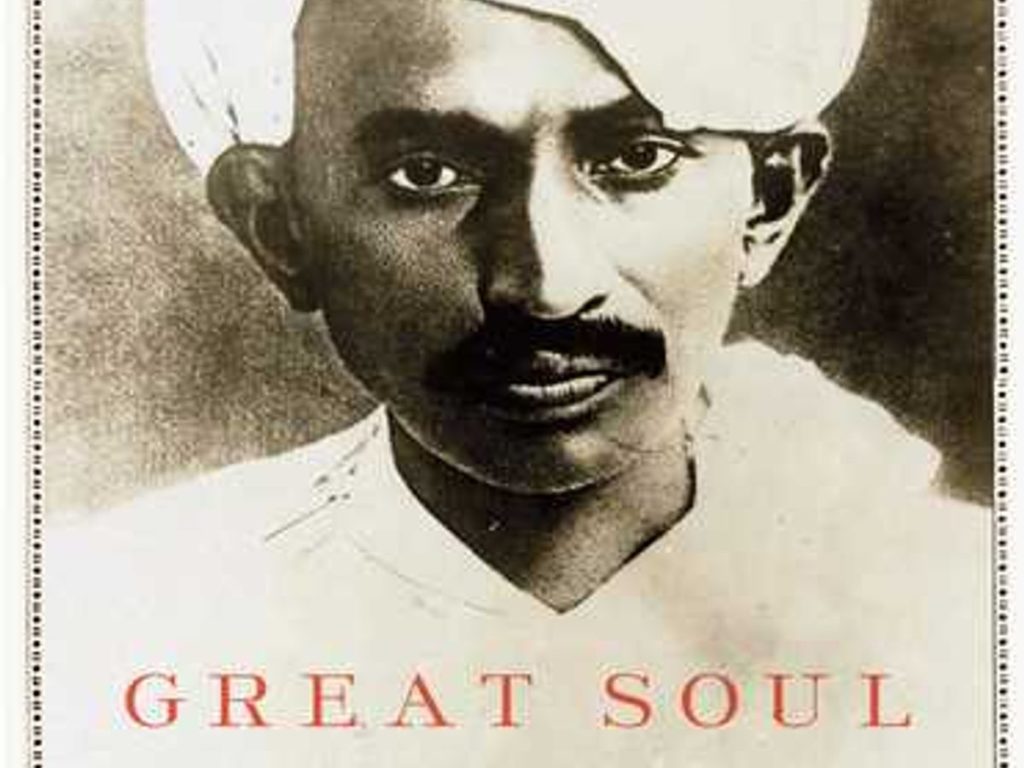Great Soul Mahatma Gandhi and his struggle with India. Joseph Lelyveld.
With every “Great Soul” comes great complexity. Gandhi is no exception. Lelyyeld has written a remarkable biography that burrows deep into the complexities of this man and the world in which he lived.
Gandhi the absentee husband & father — after 21 years of marriage, of which he only spent 9 living with his wife & family he simply declared to his wife that there would be no more sex, and that his calling was higher than that of husband and father. His calling was to India, without remorse he made the disengagement with his family official, it was the price they all must pay. His wife was Gandhi’s greatest source of frustration, She didn’t believe like he did, and the more welcoming he became of Untouchables the more he expected her to serve them, which was very difficult for her. If ever Gandhi was tempted to give up his belief in non-violence it was with his wife. His four sons struggled in their development without a father, causing family strife in later years. Gandhi seemed willing to lead people but not live with people, this was part of his commitment to detachment.
Gandhi the celibate — Gandhi embraced a branch of Hinduism which taught that a man loses strength every time semen leaves his body. Thus he encouraged anybody who would listen to give up sex. He was shocked and discouraged to discover that in his sixties he would still have erections, so to practice detachment, he secured the services of a 17 year old relative to sleep naked with him at nights, so as to be finally rid of lust. This created no small stir within his entourage, and eventually he gave up the practice.
Gandhi the detached – His 30 year tirade against sex was born out of a greater Hindu belief that sought to detach ones self from the trap of pleasure. The doctrine taught that giving in to strong urges & desires always leads to despair, therefore all strong urges for pleasure were to be resisted. Food, for example was for sustenance only. Housing should be very simple. Anger also was a desire that should never be acted on in violence to another. When Gandhi experienced anger and felt as though he must lash out, he would strike himself in the head as a compromise. Power was to be shunned as well, and even though Gandhi wielded lots of it for much of his life, he seemed ambivalent to it. Often disappearing for months at a time.
Gandhi the politician – National Unity was his priority, his convictions to bring it about were: Peace between Hindu’s & Muslim’s, the ending of Untouchability, self sustained living for each village in india by teaching everyone to grow their own food, and make their own clothes, and Non violence as a way of life. Gandhi had to prioritize these values often creating controversy. Gandhi often said “the only reliable position I have on an issue is the last thing I have said.” Gandhi was also a solo show, he was not interested in consulting anyone about his leadership decisions. His preference was to be alone at the top.
Gandhi the humble – He visited hospitals, nursed Untouchables in their dying hours, rode only third class, welcomed Untouchables in to his schools, and he wore the clothing of these despised people. All of this was unthinkable in his day. He cared nothing for power, prestige or image. He wanted to defend the week, by liberating them from the tyranny of their caste system. His own peril & discomfort were always secondary in his mind. Often worshiped, Gandhi dismissed these affections, saying the time was not for hero worship but for service.
Gandhi the failure? — Everything came crashing down on Gandhi. He was unable to keep the Muslims & Hindu’s from slaughtering each other, The British took the violence as an opportunity to justify violent crackdowns of their own. The masses of India, didn’t embrace his vision of self sustenance. For some reason his views on sex did not gather a large following 🙂 India did end up being carved up into three separate countries because of religious differences, and the caste system remained. But yet Gandhi is revered & loved world wide. Why? On a positive note it took 50 years from the time of Gandhi’s assassination for Hindu Muslim violence to resume in earnest (2002). While he was alive he was able to control the violence somewhat, through hunger strikes. 17 in all. “I won’t eat until you guys learn to play nicely” was the strategy, and since Gandhi was one of the few who had the respect of all sides this strategy actually worked. Surely it would have been way worse had he not been there.
Gandhi the Hindu — He was strongly influenced by Christianity, but remained a Hindu, believing that “Everything you have in your Scriptures we have in ours.” He was a tremendous help to Muslims, but didn’t want to become one. In the end it was a Hindu assassin that killed him, because of his closeness to Muslims. As a Hindu he had a real challenge before him: Untouchability existed as a primary tenant of Hindu belief. The caste system is based on the belief that your current life is judgement or reward for a past life. If you are low caste it is because of your sins. The gods have willed it. Gandhi tried in vain to change the theology of Hindu religious leaders. Grudgingly, Hindu’s bent their theology a little bit to slightly improve the quality of life for Untouchables, but it was only because Untouchables by the thousands were converting to Islam, Christianity & Buddhism in order to carve out better lives for themselves. To Embedcar the other significant leader of that time period Gandhi was pathetic because he refused to see Hinduism for the bankrupt religion that it was. Embedcar converted to Buddhism and led about 2 million Untouchables with him into that faith.
Gandhi the optimist: Often there is not much discernible difference between an optimist and a liar. For example when Gandhi returned to India from South Africa, he credited himself with creating a virtual utopia of unity & independence among the Indian’s of South Africa. It’s a nice story, and Gandhi did a lot of good things in Africa, but the hype doesn’t measure with the facts. Gandhi capitalized on this optimistic version of the events in Africa in order to get himself instant credibility in India and a clear path to positions of influence.
Gandhi the idealist: Ideally you would think if a bad person was doing bad things, and a good person protested in reasonable and non violent ways. The bad person would feel guilty and change his ways. Gandhi projected this ideal into the real to a fault, so for example, when asked what the Jews should do in Germany with Hitler, he suggested that the Jews simply talk to him, Hitler would feel bad, and then change his policies.
Confronting familiar ideas and accepted norms of living are more challenging then confronting armies, and as history has proven, if you confront one you almost certainly have to confront the other. Gandhi, though flawed and “quirky” by Western standards, fulfilled his confrontational destiny with humility, fearlessness and unyielding resolve.




